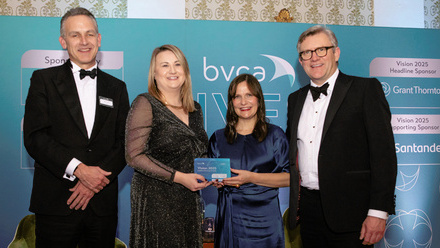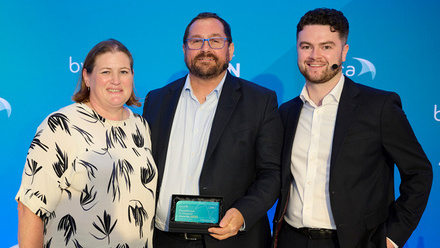Reflecting on the Changing Landscape of Sustainability in Private Capital
Ahead of the Excellence in Sustainability Awards, judges – Maria Carradice and Michelle Lamprecht – share their reflections on the drivers accelerating ESG adoption in the UK.
Whilst global leaders are shifting their stance on sustainability, the past year has seen significant advancements in ESG and sustainability practices, especially within the mid-market private equity sector in the UK. Companies have increasingly embedded sustainability into their core strategies, responding to heightened investor demand for responsible and ethical investments. Key developments include increased regulatory requirements and transparency in ESG reporting, and a greater focus on climate-related financial disclosures. The industry remains committed to sustainability because we recognise the genuine, measurable benefits of focussing on critical issues like climate change, renewable energy and cybersecurity over the longer term, building resilience and enduring value across our portfolios.
The recent COP29 conference and record extreme weather events have further emphasised the global urgency to address climate change, resulting in new commitments and more regulation. Ongoing geopolitical tensions have exacerbated the need for secure energy from renewables and less reliance on the old-world order for fossil fuels. The cost of living pressures coupled with high inflation and interest rates mean that we need to re-imagine sustainability initiatives to deliver both economic and environmental benefits. These developments are likely to have significant implications for the private equity industry over the next few years, pushing firms to incorporate more comprehensive sustainability criteria into their investment decisions.
Enhanced regulatory frameworks and international cooperation will drive the need for greater accountability and transparency. For future investments, this will mean an increased focus on sustainability performance, innovative green technologies, and projects that contribute to a low-carbon economy. As a result, the private capital industry must stay ahead of these trends to remain competitive and fulfil their fiduciary duties while also playing a key role in contributing to global sustainability goals.
Market Drivers accelerating ESG adoption
- Investor demand for responsible capital
Institutional investors are increasingly prioritising ESG in their investment decisions. Pension funds, sovereign wealth funds, and family offices are seeking funds that align with sustainability objectives. This shift is evident in both venture capital (VC) and private equity (PE), where investors look for firms that integrate sustainability from the outset or have matured into robust ESG-compliant organisations. - Government policies
Government policies are playing a pivotal role in accelerating the adoption of sustainability practices and unlocking capital for impact-driven investments. The UK’s Green Finance Initiative and Net Zero Strategy provide a foundation for private capital to support green growth. These government-backed programs create an environment where private equity and venture capital can finance innovations in clean energy, green technologies, and carbon reduction projects. As governments pursue these agendas, they encourage investments in sectors aligned with long-term sustainability goals. - Innovation as a Driver for Economic Growth
Innovation is central to the UK government’s agenda for economic growth. Policies supporting green technologies and low-carbon innovations provide substantial opportunities for private capital. Initiatives like tax incentives, grants, and funding programs are enabling the scaling of clean technologies and energy-efficient solutions. Venture capital firms, in particular, are well-positioned to support early-stage innovations in sectors like clean tech, electric vehicles, and carbon capture technologies. - Regulations shaping the future
An important market driver is the evolving regulatory landscape, particularly Sustainability Disclosure Requirements (SDR) and the Corporate Sustainability Due Diligence Directive (CSDDD). These regulations are pushing private equity and venture capital firms to adopt more robust ESG practices.- Sustainability Disclosure Requirements (SDR) - introduced by the UK government, mandates detailed ESG disclosures aligned with the EU’s Corporate Sustainability Reporting Directive (CSRD). This transparency ensures investors have reliable data on a company’s sustainability performance. As a result, capital is unlocked for businesses that align with sustainability goals.
- Corporate Sustainability Due Diligence Directive (CSDDD) - requires firms to assess their supply chains for adherence to environmental and social standards, meaning that private equity and venture capital firms must evaluate the broader impact of their investments. This helps drive long-term value while meeting ESG standards.
- Unlocking Capital for Impact Funds
The rise of impact funds is also a significant trend, driven in part by SDR and CSDDD. These regulations create an environment where private equity and venture capital firms are incentivised to focus on investments with measurable environmental and social impacts. By ensuring greater transparency and accountability, ESG-compliant companies are more attractive to investors, unlocking capital for initiatives with long-term positive outcomes.
The private capital industry is at a pivotal moment. With regulatory changes, growing investor demand, and the urgency of geopolitical challenges, firms must act quickly to integrate sustainability into their investment strategies. The BVCA’s Excellence in Sustainability Awards offer a blueprint for others in the industry, highlighting firms leading the charge in integrating ESG into their business models. There is increasing evidence that the market will reward those who embrace sustainability as a core investment strategy.

Authored by Maria Carradice, Mayfair Equity Partners
and Michelle Lamprecht, Cambridge Innovation Capital
Maria and Michelle are both members of the BVCA's Excellence in Sustainability Awards judging panel.






